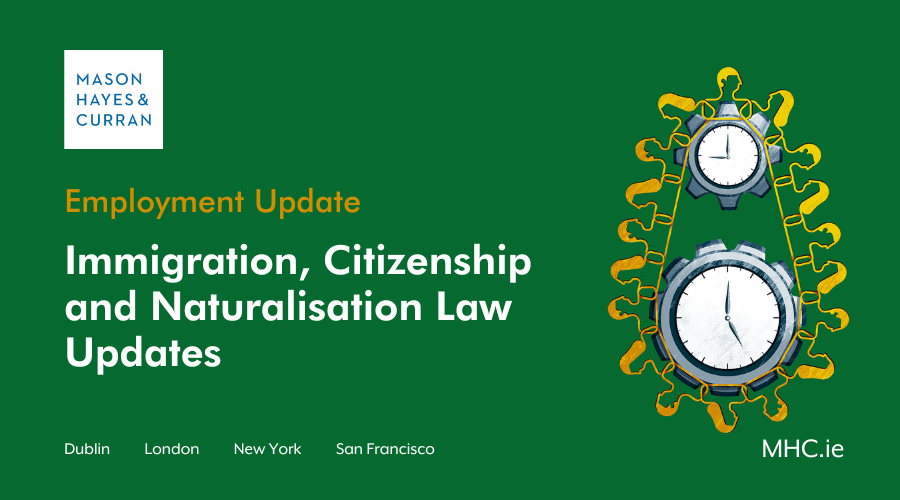Immigration, Citizenship and Naturalisation Law Updates

The Minister for Justice recently commenced the majority of the provisions of the Courts and Civil Law (Miscellaneous Provisions) Act 2023. It introduces changes to immigration, citizenship and naturalisation legislation in Ireland. Our Business Immigration team reviews these legislative changes as well as some other recent updates in the area.
Minister for Justice Helen McEntee recently commenced the majority of the provisions of the Courts and Civil Law (Miscellaneous Provisions) Act 2023 (The Act). The Act introduces some significant changes to immigration, citizenship and naturalisation laws and procedures in Ireland. The amendments aim to improve access to justice and streamline processes to become more people-centred.
The Act, along with some other changes, is in keeping with the Department of Justice’s immigration action plan seeking to improve immigration services and make the system more user-friendly and efficient.
Courts and Civil Law (Miscellaneous Provisions) Act 2023
For the purposes of calculating continuous residency for naturalisation applications, the Act extends the time an applicant can be outside of Ireland from 6 weeks to 10 weeks. Applicants can be granted a further 30 days in exceptional circumstances. Reasons for an extension include:
- Family or personal circumstances
- Health of the applicant or a family member
- Employment or study requirements
- Voluntary service for humanitarian purposes, or
- Other circumstances beyond the control of the applicant
The residency requirement for children born in Ireland to non-resident parents has also been reduced from five years to three years. The child must have one year’s continuous residence immediately prior to the application for citizenship. In addition, during the eight years immediately preceding that, they must have a total residence amounting to two years. Minister McEntee hopes this will provide comfort and certainty to children and their families.
The Act amends the Immigration Act 1999 to provide for persons who are convicted of serious offences or are considered a danger to the security of the State. The relevant individuals can be served with a deportation order under this provision without the option of leaving the State voluntarily. This has the effect of preventing their return to the State in future.
The Act also amends the Immigration Act 1999 to allow the service of documents electronically. This will reduce the administrative burdens associated with serving documents by post and increase flexibility for applicants. A digital portal will be rolled out in the coming years to support this measure.
These changes apply retrospectively and so will apply to those with naturalisation applications currently pending.
Administrative updates
Guidance Document for Naturalisation Applications
In May 2023, the Irish Government published a new guidance document for naturalisation applications. Key changes were made to the following:
- Residency documents: the number of documents that must be submitted has been reduced to two documents per year of residency
- Proof of residency: applicants can provide a residential proof affidavit where they cannot provide the necessary residency documentation
- Bank statements: applicants need only provide three consecutive months of bank statements for each year of residency, as opposed to the previous requirement of six months
- Refugees: those applying based on refugee status who do not have a valid passport may submit a certified copy of their Irish travel documents, a letter confirming their refugee status, and an affidavit detailing certain personal information
Conclusion
The Courts and Civil Law (Miscellaneous Provisions) Act 2023 has brought in significant changes to citizenship by naturalisation applications in Ireland. The Act and other administrative changes are steps in the direction of modernising naturalisation and citizenship. Minister McEntee said the amendments will simplify and improve the legal processes which are often made in challenging and stressful situations.
Individuals with applications pending, and those who intend to make these applications should familiarise themselves with these new provisions and procedures.
For more information on the impact of the Act provisions on your organisation’s recruitment and retention efforts, contact a member of our Employment Law & Benefits team.
The content of this article is provided for information purposes only and does not constitute legal or other advice.
Share this:



